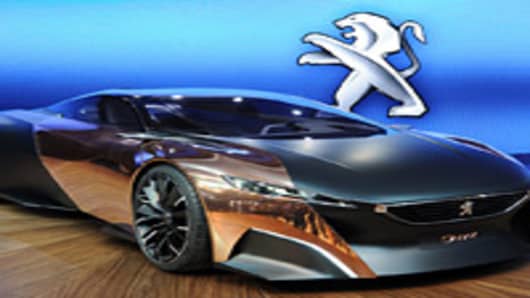The biannual Paris Motor Show kicks off on Wednesday, with carmakers eager to show off the latest technologies to help them compete in a market that is looking increasingly crowded.
Yet again, the focus lies with electric and hybrid vehicles. Returning and new manufacturers will launch new models and promote sustainable mobility. And visitors can take the latest e-vehicles for a spin on the test drive track.
Over the next few days, some of the show-stopping models on display include Audi’s new A3 Sportback and the S3 hot-hatch. Jaguar comes to Paris with its eagerly-anticipated and Porsche-rivaling F-Type sports car.
Dr. Ralf Speth, CEO of Jaguar Landrover, reveals the brand new Range Rover to the world, 420 kg lighter than its predecessor. And Volkswagenwill present its sevent generation of the Golf, one of the bestselling models in history.
But despite these numerous new launches, European car makers face tough headwinds. Lukewarm European car sales, ever stronger competition from Asian car makers, higher energy costs and a stronger euro are putting pressure on industry margins.
Latest European car sales numbers published by ACEA show sales slipping by 8.6 percent in the first eight months of the year. The ongoing euro zone debt crisis is central to the decline in sales. Sales in Italy fell by 20 percent and sales in Finland by 25 percent. France’s car market shrunk by 11 percent, and even in Germany sales slowed by almost 5 percent in August.
Amongst the worst hit is Ford , with European sales down by 29 percent. Fiat’s car sales fell by 18 percent and even luxury brand BMW recorded a drop in sales of 12 percent.
Whilst the show's slogan "The future, now!" may refer to technological advances in the sector, the focus will remain on how to navigate the global economic downturn. At least for European car makers, the "R" in "R&D" most probably will have to stand for ‘Restructuring’ & Development’.
Over the past three years U.S. car manufacturers such as GM and Chrysler have gone through painful restructuring. Their earnings are starting to look better. European carmakers however, are just on the verge of their cost cutting cycle, with Daimler recently cutting its sales forecast for Mercedes-Benz cars. Some analysts expect Daimler to announce thousands of jobs cuts. Over at Fiat, talks with the Italian government may not safeguard employment. It seems unlikely the car manufacturer will receive any state aid.
So what will the future for the European car industry look like? No big changes: revenue growth lies beyond European borders and mostly in emerging markets. According to the German car association VDA, the U.S., Brazil and Japan are the hottest markets, with sales up about 20 percent in the US, and 32 percent in Brazil. And even Japan’s car market — post Fukushima — bounced by 15.6 percent.
The tricky question is: will that dynamic hold up till the euro zone debt crisis is resolved, bringing European car makers a more perky domestic market?


